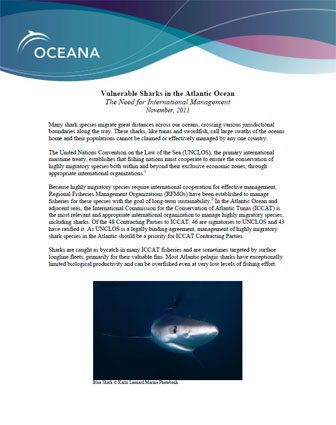Report | November, 2011
Vulnerable Sharks in the Atlantic Ocean
Many shark species migrate great distances across our oceans, crossing various jurisdictional boundaries along the way. These sharks, like tunas and swordfish, call large swaths of the oceans home and their populations cannot be claimed or effectively managed by any one country.
The United Nations Convention on the Law of the Sea (UNCLOS), the primary international maritime treaty, establishes that fishing nations must cooperate to ensure the conservation of highly migratory species both within and beyond their exclusive economic zones, through appropriate international organizations.
Because highly migratory species require international cooperation for effective management, Regional Fisheries Management Organizations (RFMOs) have been established to manage fisheries for these species with the goal of long-term sustainability.2 In the Atlantic Ocean and adjacent seas, the International Commission for the Conservation of Atlantic Tunas (ICCAT) is the most relevant and appropriate international organization to manage highly migratory species, including sharks. Of the 48 Contracting Parties to ICCAT, 46 are signatories to UNCLOS and 43 have ratified it. As UNCLOS is a legally binding agreement, management of highly migratory shark species in the Atlantic should be a priority for ICCAT Contracting Parties.
Sharks are caught as bycatch in many ICCAT fisheries and are sometimes targeted by surface longline fleets, primarily for their valuable fins. Most Atlantic pelagic sharks have exceptionally limited biological productivity and can be overfished even at very low levels of fishing effort.




